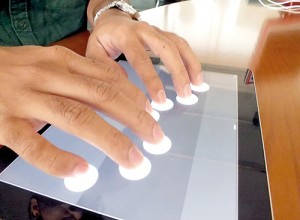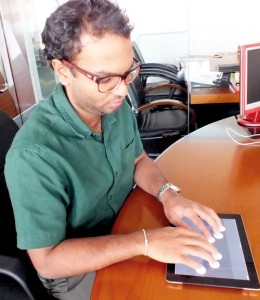Sri Lankan helps create world-acknowledged IT app for the blind
With many Sri Lankans achieving excellence in the creation of new products and applications in this new technological era now comes the news of another breakthrough product involving a Sri Lankan that would help the blind across the world.
The iBrailler Notes (iBN) system that benefits the blind the world over is a world-class invention researched and formulated by a Sri Lanka Information Technology (IT) expert along with his mentor Prof Arian Lew, Stanford University USA and supported by National Science Foundation of Sri Lanka (NSF).

Close-up of the pad
This iBN programme could be run on Apple iPad and iPhone. Dr. Sohan Dharmarajah, CEO, Neotenicity is heading this IT company which is located in Kollupitiya in the heart of Colombo.
The creator of this product did his Masters at Massachusetts Institute of Technology and the PhD at the Stanford University. He developed the product two years ago when the US Army conducted an IT competition for the Apple iPad in the United States.In the Apple iPad there is already a program for the blind called “Voice Over”. To access this program, the user must place the fingers on the iPad when the fingers move across the iPad it reads the letters and marks when the finger touches them. This method appeared to be little tedious for to get the letter ‘a’ and letter ‘p’ the fingers have to reach a long distance.
When the Business Times Team (BT) met Dr Dharmarajah at his Colombo office, he explained in detail as to how he got involved in this valuable IT research. He said that he along with Prof Lew applied for the competition and started working on this ‘iBrailler Notes’ project.
The iBrailler Notes software program is a simplified version of the ‘Voice Over’ program where when fingers are place on the iPad the entire ‘keyboard’ comes under the fingers.

Dr. Sohan Dharmarajah
As in the case of typewriter guide keys, in the iPad wherever the 10 fingers are placed on the iPad 10 circles appear on the iPad. This iBN system operates with the normal Braile system which blind people use.
It works with a combination of dots, three and three, six digit operation. The letters form a combination of dots – three plus one – two plus three – and the system goes on with different combinations. Thus words, sentences and even paragraphs are easily formed and the operation by the blind on the Apple iPad has become extremely easy.
The system won the first place in the competition, beating other US competitors. After Dr. Dharmarajah completed his PhD he returned to Sri Lanka and started ‘Neotenicity’, to do mathematical and IT consulting and also started further developing the ‘iBrailler Notes’.
Thereafter Dr. Dharmarajah said they applied to the NSF, received approved and a financial grant was given to testing the product at the Blind Training School run by the Employers’ Federation of Ceylon.
The Apple iPad accepted the iBrailler Notes’ to be part of its programs and the research to improve the program had also taken two years and was introduced to Apple iPad in February this year.
Dr. Dharmarajah was happy that together with his mentor he was able to help humanity throughout the world. “Thereis no doubt this would create a sensation amongst the blind all over the world. We have already applied for US patents for this invention”.
The product is in the market now, he said, adding that the response has been very positive so far. He said that the main purpose in introducing iBN is not to profit from it but to provide a service. There are two programs – one is the introduction to the program which is free of charge.
He said they were planning to work with all the blind schools in the country.
Earlier a Science Officer from NSF arranged a demonstration with Neotenicity to show how this whole iBrailler Notes software works. The demonstration was done by Malaka Ratuwithana, the company’s Product Evaluator.


